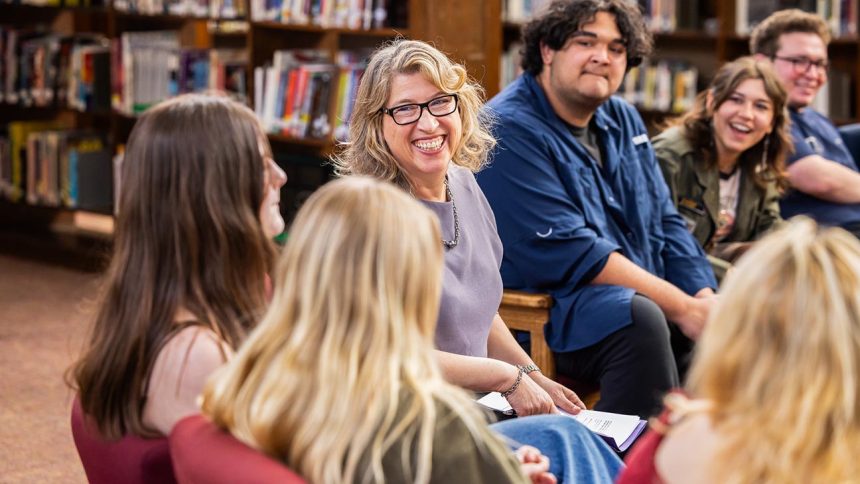How Lauren Greenfield Turned a Documentary Series About L.A. Teens Into a Global Art and Activism Project
Nearly a year has passed since Social Studies, Lauren Greenfield’s sweeping documentary series on modern teenage life in Los Angeles, aired on FX and hit Hulu for streaming. At a moment when most filmmakers might be mapping out a follow-up, Greenfield finds herself even more deeply embedded in the project than she was during production. The Emmy-nominated five-part series, filmed at a high school in the Pacific Palisades, has taken on a second life — one that blurs the lines between film, activism, gallery art and cultural intervention.
Greenfield’s funny, poignant and piercingly honest portrait of L.A. teens navigating high school’s social terrain in the post-pandemic era — shot before the brutal January 2025 wildfires scorched the landscape — captures the awkwardness and beauty of adolescence with rare precision. One of the series’ great strengths is its refusal to sentimentalize. Greenfield lets her subjects speak plainly, drawing out raw truths from teens raised on the disorienting feedback loop of social media.
Since Social Studies’ widely acclaimed premiere, Greenfield has expanded the project, using it to advocate for legislation limiting phone use in public classrooms, and launching an international gallery show inspired by the series. Just weeks ago, she received her first Emmy nomination, with Social Studies up for best documentary.
“I didn’t watch the nominations live. I didn’t want to jinx it,” she tells The Hollywood Reporter. “But then the texts started coming in.” They weren’t from FX or Hulu, but from the teens she had filmed. “They were more excited than I was. And that made the recognition feel even more meaningful.”
You Might Also Like
Greenfield, whose career spans photography (Fast Forward: Growing Up in the Shadow of Hollywood, Girl Culture), film (Thin, The Queen of Versailles, Generation Wealth) and installation art, has long chronicled the aspirations and excesses of American life. But with Social Studies, she shifts focus to something more urgent: a generation coming of age inside the algorithm.
Shot and edited over several years in Southern California, the series functions as both cinema verité and digital-age anthropology. It’s layered, intimate and attentive to the textures of teenage life in the era of platform capitalism. From self-reinvention to online confession, Greenfield examines how identity is shaped and warped by life lived through a screen. Appearing in the film herself during group forums with her subjects, she’s not just a director but a maternal presence, invested in the lives of the teens she films.
At a screening in Sacramento, Greenfield and her teenage collaborators presented the film to state senators and assembly members. “There was a lobbyist who started to cry during the Q&A,” she recalls. The moment that moved him featured a grieving mother whose son had died by suicide after being drawn into dark corners of the internet. “You expect lobbyists to have thick skin. But in that room, they responded as parents.”
Greenfield isn’t campaigning for awards in the traditional sense — no FYC luncheons, no velvet-rope strategy. Instead, she’s focused on what she calls “organic outreach”: screenings with youth advocacy groups, panels with Common Sense Media and educational programming. “Teenagers aren’t scrolling through Hulu looking for documentaries,” she says. “You have to meet them where they are.”
A photography show tied to the series ran at Fahey/Klein Gallery in L.A. from May 22 to July 3. Next fall, Social Studies travels to Berlin and then Fotografiska Stockholm, where an immersive museum exhibition will incorporate large-scale photographs, multimedia work and experiential installations. One installation re-creates a subject’s bedroom, curated by the teen herself. Another invites viewers into a custom algorithm — a quietly radical simulation of digital subjectivity.
“It’s like Ebert’s idea of documentaries as empathy machines,” Greenfield says. “But this time, the machine is the feed.”
The ripple effect of Social Studies wasn’t entirely unexpected. Greenfield has always treated her work as cultural archaeology. Still, the scale of this project’s afterlife has surprised even her. “It just keeps evolving,” she says. “It’s a living thing.”
Regardless of whether it wins the Emmy, Social Studies has already succeeded — slowly, deliberately and outside the machinery of prestige television. “We’re not living or dying on awards,” Greenfield says.
As for what’s next, she’s deep into several projects: Her legislative push around teen phone use continues, and the Queen of Versailles musical, starring Kristin Chenoweth, opens on Broadway in November. But her focus remains on the crisis she sees unfolding.
“I think social media is a really important issue right now — it’s shaping our politics, our civic life, and it’s at a crisis point for young people. It’s a generational problem. I’ll be trying to shed light on it until it’s no longer a problem,” she says, pausing. “Maybe longer.”
This story first appeared in an August stand-alone issue of The Hollywood Reporter magazine. To receive the magazine, click here to subscribe.


